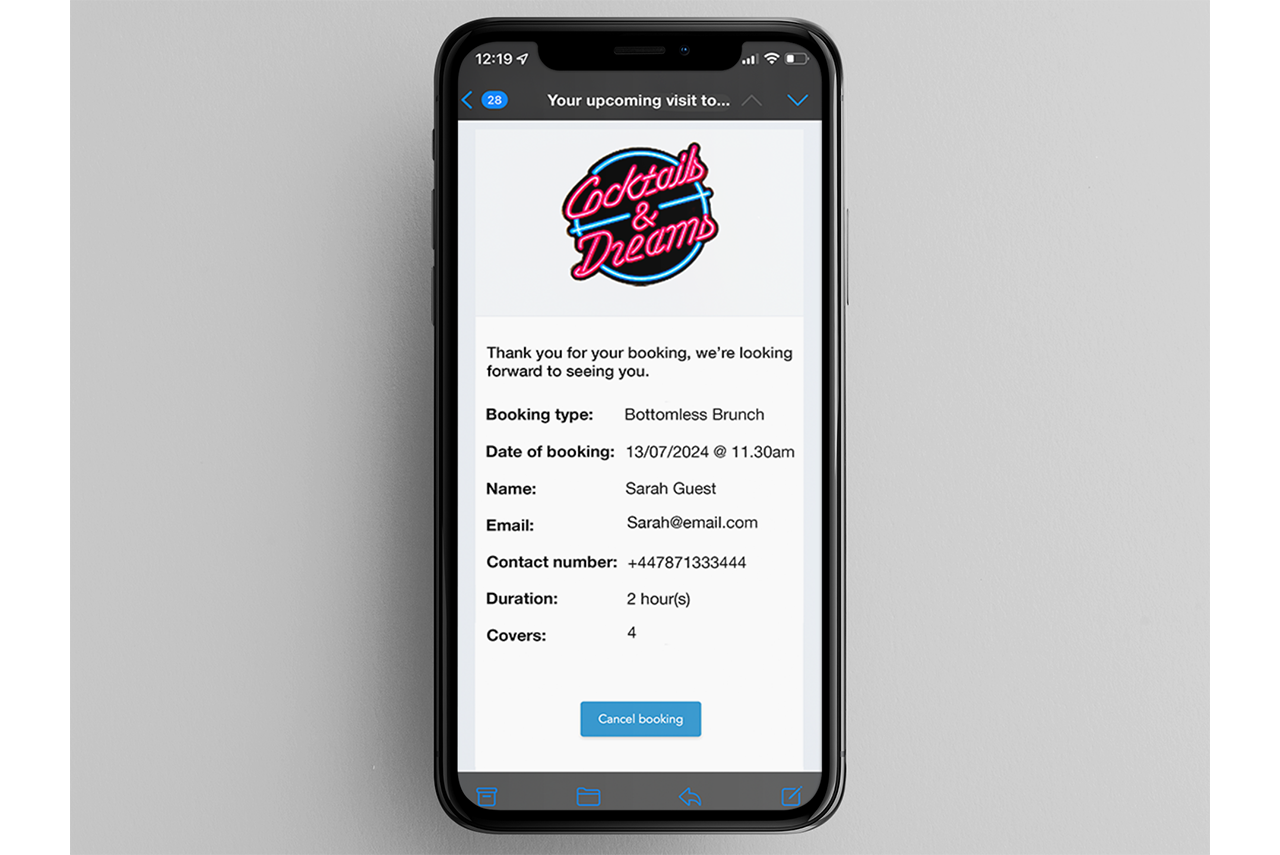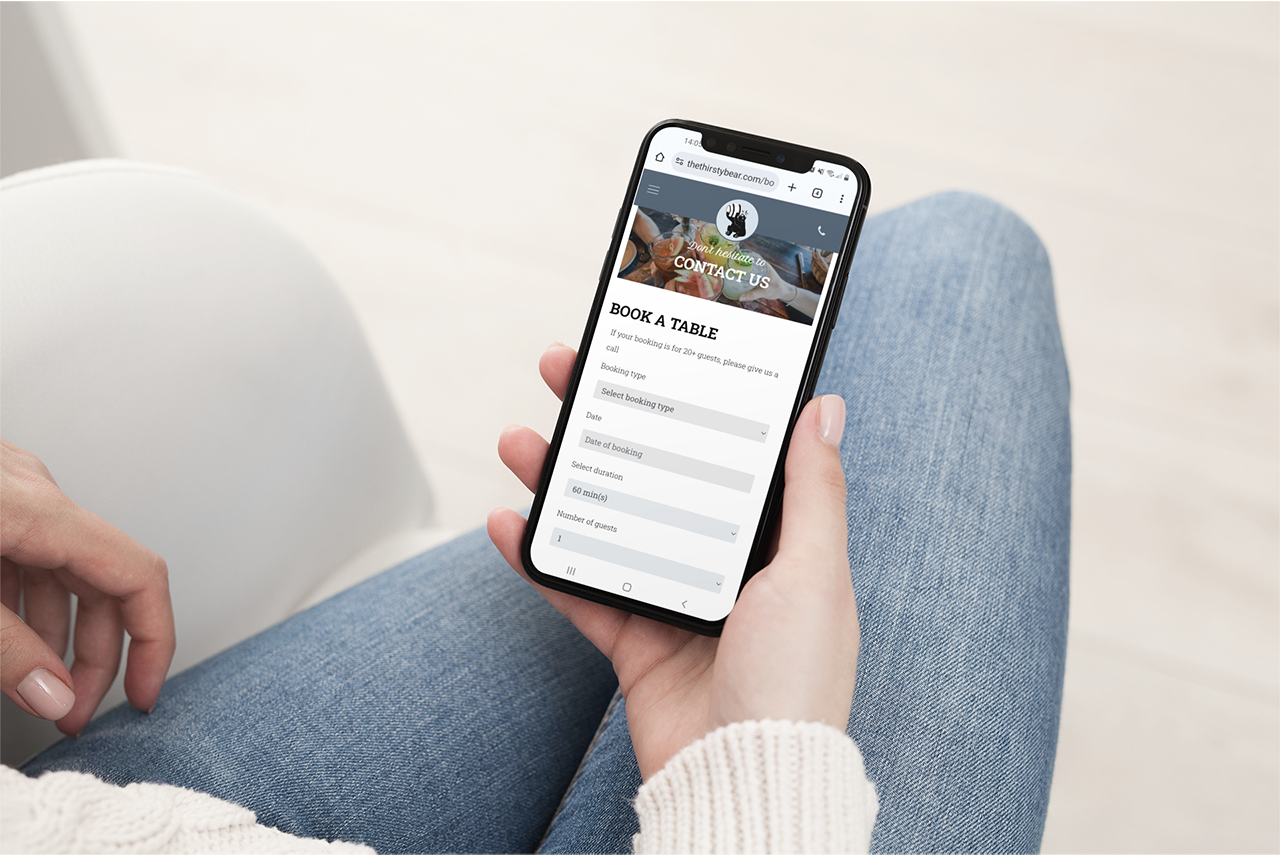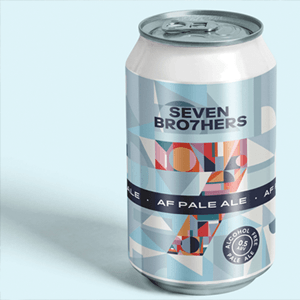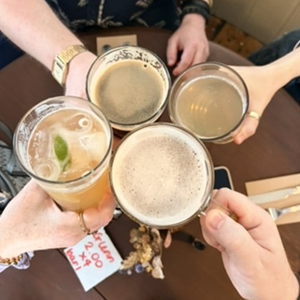Guide to restaurant cancellation policies
Cancellation fees have become a necessary evil for restaurants in the UK. With the hospitality industry facing intense financial pressures, every no-show and last-minute cancellation hits hard. The need to protect revenue is forcing many venues to put measures in place to reduce their impact.
2025 research by Dojo reports that
92% of restaurants had lost revenue due to no-shows, with the average loss around
£50 for a table of two. This could end up being more if you’ve bought in stock or scheduled staff especially for a booking that no-shows. The figure widely quoted across industry publications is that
£17 billion a year is lost due to no-shows. So how do we stem the tide?
Deposits, card pre-authorisations and no-show fees can greatly reduce the number of no-shows and last-minute cancellations, and a clear and fair cancellation policy specifies those details and ensures customers know exactly where they stand.
Done properly, cancellation fees and policies protect your business from harmful loss of profits. While the guidance here focuses on restaurants, it also applies to any hospitality business that relies on bookings, such as sports bars and competitive socialising venues.
Why do no-shows happen?
No-shows and last-minute cancellations are often completely innocent. People might genuinely forget, one of their party might get ill, or they might fall foul of transport delays. Economic issues are also a factor. People are more strapped for cash, and unexpected bills might swallow the funds they were planning to splash out on their meal or activity.
However, a minority of guests just aren’t cancelling if they change their plans. Some even engage in ‘reservation squatting’, where they book the same time slot at several restaurants, then decide where to go on the night.
It’s this minority that forces venues to implement protective measures, which unfortunately affect the majority of honest customers too.
Are cancellation fees legal?
A restaurant reservation is a contract, and like any contract customers enter with a business, restaurants are entitled to protect against loss of income due to early termination. However, you must ensure your cancellation policy falls within legal guidelines. Below is information provided to consumers by Citizen’s Advice, which you can use as a guideline:
- Businesses can keep your deposit or advance payments, or ask you to pay a cancellation charge, only in certain circumstances
- If you cancel the contract, the business is generally only entitled to keep or receive an amount sufficient to cover their actual losses that directly result from your cancellation (e.g. costs already incurred or loss of profit)
- Businesses must take reasonable steps to reduce their losses (e.g. by re-selling the goods or services)
- Non-refundable deposits should only be a small percentage of the total price
- Cancellation charges must be a genuine estimate of the business’s direct loss
So it’s vital to ensure your cancellation policies are not overly punitive. Not only does this avoid alienating customers, but it also keeps you in line with regulations.

What should a restaurant cancellation policy include?
Your cancellation policy must specify a few key details to be effective:
Specify the notice period. How long in advance do guests need to cancel to avoid fees? Larger group sizes or bookings for special events may require longer notice periods, so make sure you clarify any variations.
Tell people how much they’ll be charged for no-shows and cancellations made after the notice period cutoff. Specify whether the fee is per booking or per head. You should also consider whether you will charge for partial no-shows, where one or more member of a booking does not arrive.
This is especially important as we head into Christmas, with those large office parties. If there’s a booking of 20 but only 16 show up, that’s four free seats. But since you’ve already set the table, you can’t resell them as a table of four, so you lose out on that income. However, if you expect that the group will spend plenty on drinks, you might choose to waive cancellation fees as a gesture of goodwill.
Tell guests how to cancel. Simple and easy-to-follow cancellation processes are one of the most effective ways to reduce no-shows, but you’d be amazed at how many venues don’t tell guests what to do. If you include a cancellation link in their confirmation and reminder emails, tell them. Or if you require customers to cancel by phone or email, don’t make them trawl through to your contact page – just give them the details straight away.
Restaurants often allow a grace period, giving guests 15-30 minutes after the booking time to arrive, before cancelling the booking and marking as a no-show. You should mention this in your policy too. (For competitive socialising venues, you might need to be stricter about this, as you’ll probably have shorter booking durations than a restaurant table.)
Finally, make it clear that by making a booking,
customers are agreeing to your cancellation terms. This covers you if customers dispute a cancellation fee.

Best practices for restaurant cancellation policies
Make it clear and simple
Your cancellation policy may be a legal document, but it doesn’t need to read like a courtroom transcript. Clear, simple, everyday language is the way forward. Keep it brief and get straight to the point. If you’re short of time, you can always use a generative AI tool like ChatGPT. Just feed it the factual details you want to include and ask it to incorporate them into a clear and brief policy.
Make it prominent
Don’t hide your cancellation policy in some remote corner of your website, or hidden in a long list of other rules and regs. The closer to the moment of booking that customers see the cancellation policy, the more likely they are to follow it. So the best option is to put it right there on your booking form.
If you can’t or don’t want to do this, you could include it in the footer of your website, or in your FAQs section. Research suggests that
almost half of people who no-show actually wanted to cancel, but couldn’t find out how to do it. So make it easy for them.

Be transparent and show empathy
Showing customers that you understand them goes a long way. You could mention how you ‘appreciate that things can change unexpectedly, but please let us know’. And don’t be afraid to be honest. Most people appreciate the financial pressures affecting restaurants. You don’t need to go into grim detail, but simply mentioning that no-shows have a big impact on your business encourages people to do the right thing.
Be flexible
Cancellation fees are not a one-size-fits-all solution. For example, your casual lunch sitting might only require a small fee. But for your evening sitting that involves much more prep, stock, and staff, you might charge more to reflect the higher costs. Likewise, if you have special events that need to be booked in advance, you could charge higher fees as seats may be harder to resell.
Something else to bear in mind is your relationship with the customer. If a regular has to cancel at the last minute, you might want to waive the cancellation fee as a gesture of goodwill, so you maintain the relationship and encourage them to keep coming back.
How to structure your cancellation policy
How much should you charge customers who no-show? This will vary for each business. Remember, UK law states that cancellation charges must reflect a genuine estimate of the cost and loss incurred. So you can’t be overly punitive. It’s a fine balance between protecting your revenue and being reasonable with guests.
Likewise, your cancellation notice period will depend upon your venue. Some restaurants let guests cancel 24 or 48 hours before, but for others, it can be a week or more.
The right notice period depends on your purchasing and meal preparation schedules, your staffing requirements, and the nature of your customers. You might also extend the notice period for large bookings or special events where it can be harder to resell the seats.

Minimise no-shows with a hospitality booking system
Reducing the impact of no-shows and cancellations is one of the best ways to increase your booking revenue. And it’s much easier with tech designed to do the heavy lifting for you.
With our booking system, you can set up different booking types, and configure separate cancellation fees and notice periods for each one. It connects with PayPal and Stripe for
instant, secure deposits and card pre-authorisation. And it gives you full control over how you communicate your cancellation policy and manage the process, with the ability to add your policy text, create confirmation and reminder emails, and include links so customers can cancel
without creating admin work for your staff.
The
booking system
is built directly into the EPOS platform, which means everything is connected. Whenever a customer cancels a booking, alerts appear on the EPOS screen, so your kitchens and FOH staff are aware immediately and can adapt.
With clear policies and simple processes, streamlined by tech built exclusively for hospitality, your cancellation policy can be a shield against no-shows and their damaging impact. If you’d like to see how our booking system can support your business,
get in touch with our experts, who can provide a free demo tailored to your needs.
Disclaimer: This article is provided for general information purposes only and does not constitute legal advice. While we’ve referenced reputable sources such as Citizens Advice, you should seek independent legal guidance to ensure your restaurant’s cancellation policy complies with current UK consumer law.





